
漢德百科全書 | 汉德百科全书
 Malta
Malta

 Albanien
Albanien
 Aleksandar Vučić
Aleksandar Vučić
 Alexander De Croo
Alexander De Croo
 Alexander Stubb
Alexander Stubb
 Andorra
Andorra
 Andrej Plenković
Andrej Plenković
 Armenien
Armenien
 Aserbaidschan
Aserbaidschan
 Belgien
Belgien
 Bjarni Benediktsson
Bjarni Benediktsson
 Bosnien-Herzegowina
Bosnien-Herzegowina
 Bulgarien
Bulgarien
 Charles Michel
Charles Michel
 Dänemark
Dänemark
 Denis Bećirović
Denis Bećirović
 Deutschland
Deutschland
 Dick Schoof
Dick Schoof
 Donald Tusk
Donald Tusk
 Edi Rama
Edi Rama
 Emmanuel Macron
Emmanuel Macron
 England
England
 Estland
Estland

 Europäische Union
Europäische Union
 Evika Siliņa
Evika Siliņa
 Finnland
Finnland
 Frankreich
Frankreich
 Georgien
Georgien
 Giorgia Meloni
Giorgia Meloni
 Gitanas Nausėda
Gitanas Nausėda
 Griechenland
Griechenland
 Hristijan Mickoski
Hristijan Mickoski
 Ilham Aliyev
Ilham Aliyev
 Irland
Irland
 Island
Island
 Italien
Italien
 Jakov Milatović
Jakov Milatović
 Jens Stoltenberg
Jens Stoltenberg
 Jonas Gahr Støre
Jonas Gahr Støre
 Kaja Kallas
Kaja Kallas
 Keir Starmer
Keir Starmer
 Klaus Johannis
Klaus Johannis
 Kosovo
Kosovo
 Kroatien
Kroatien
 Kyriakos Mitsotakis
Kyriakos Mitsotakis
 Lettland
Lettland
 Liechtenstein
Liechtenstein
 Litauen
Litauen
 Luc Frieden
Luc Frieden
 Luxemburg
Luxemburg
 Maia Sandu
Maia Sandu
 Malta
Malta
 Mette Frederiksen
Mette Frederiksen
 Moldawien
Moldawien
 Monaco
Monaco
 Montenegro
Montenegro
 Niederlande
Niederlande
 Nikol Paschinjan
Nikol Paschinjan
 Nordmazedonien
Nordmazedonien
 Norwegen
Norwegen
 Olaf Scholz
Olaf Scholz
 Österreich
Österreich

 Parteien und Regierung
Parteien und Regierung

 Parteien und Regierung
Parteien und Regierung
 Gipfel der Europäischen Politischen Gemeinschaft
Gipfel der Europäischen Politischen Gemeinschaft
 Pedro Sánchez
Pedro Sánchez
 Petr Fiala
Petr Fiala
 Polen
Polen
 Portugal
Portugal
 Robert Abela
Robert Abela
 Robert Golob
Robert Golob
 Rumänien
Rumänien
 Rumen Radew
Rumen Radew
 San Marino
San Marino
 Schweden
Schweden
 Schweiz
Schweiz
 Serbien
Serbien
 Simon Harris
Simon Harris
 Slowakei
Slowakei
 Slowenien
Slowenien
 Spanien
Spanien
 Tschechien
Tschechien
 Türkei
Türkei
 Ukraine
Ukraine
 Ungarn
Ungarn
 Vereinigtes Königreich
Vereinigtes Königreich
 Viktor Orbán
Viktor Orbán
 Viola Amherd
Viola Amherd
 Wolodymyr Selenskyj
Wolodymyr Selenskyj
 Zypern
Zypern


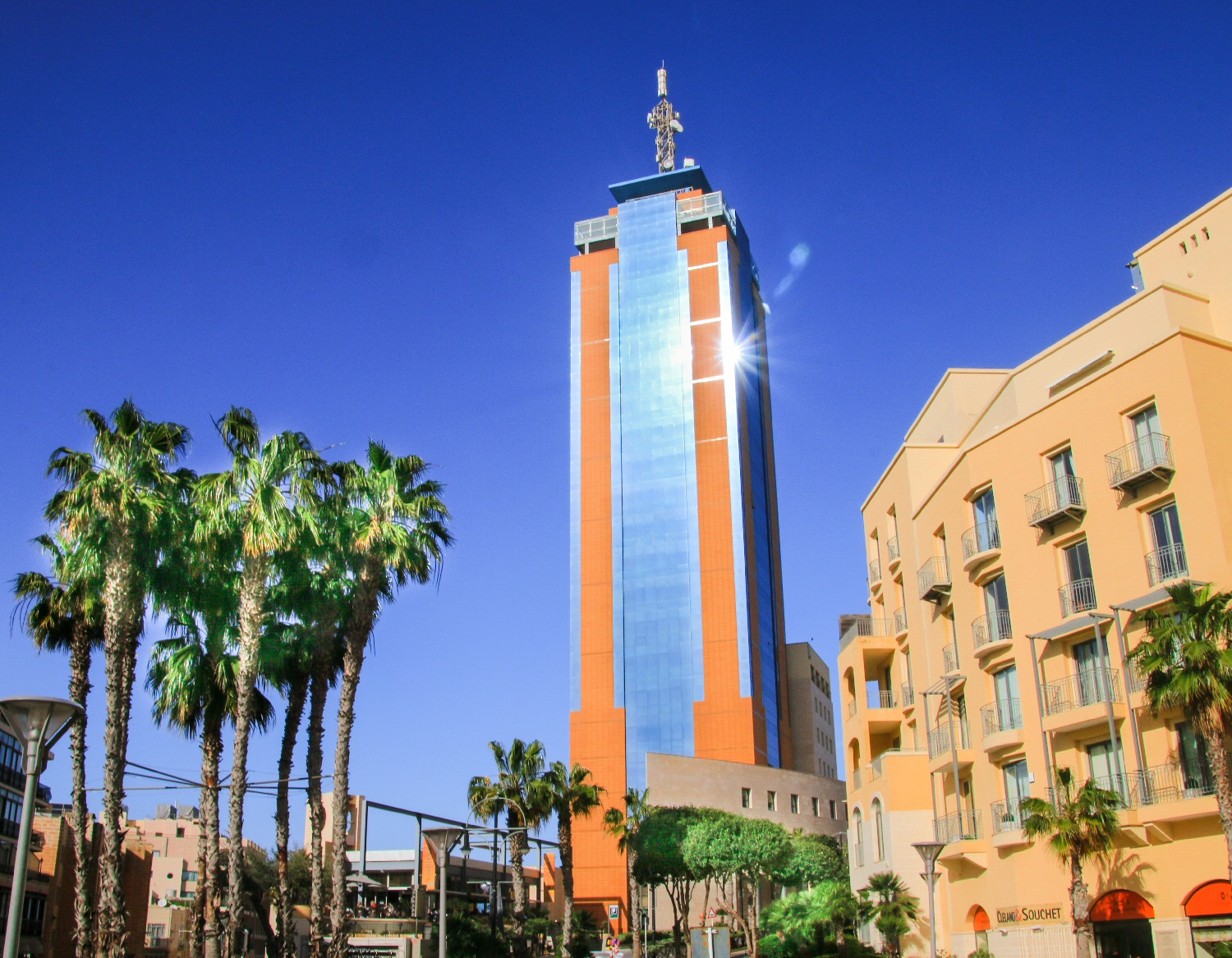

 *Mittelmeer
*Mittelmeer
 Ägypten
Ägypten
 Albanien
Albanien
 Algerien
Algerien
 Bernsteinstraße
Bernsteinstraße
 Bosnien-Herzegowina
Bosnien-Herzegowina
 Frankreich
Frankreich
 Gibraltar
Gibraltar
 Griechenland
Griechenland
 Israel
Israel
 Italien
Italien
 Kroatien
Kroatien
 Libanon
Libanon
 Libyen
Libyen
 Malta
Malta
 Malta
Malta
 Monaco
Monaco
 Montenegro
Montenegro
 Palästina
Palästina
 Slowenien
Slowenien
 Spanien
Spanien
 Syrien
Syrien
 Tunesien
Tunesien
 Türkei
Türkei
 Zypern
Zypern
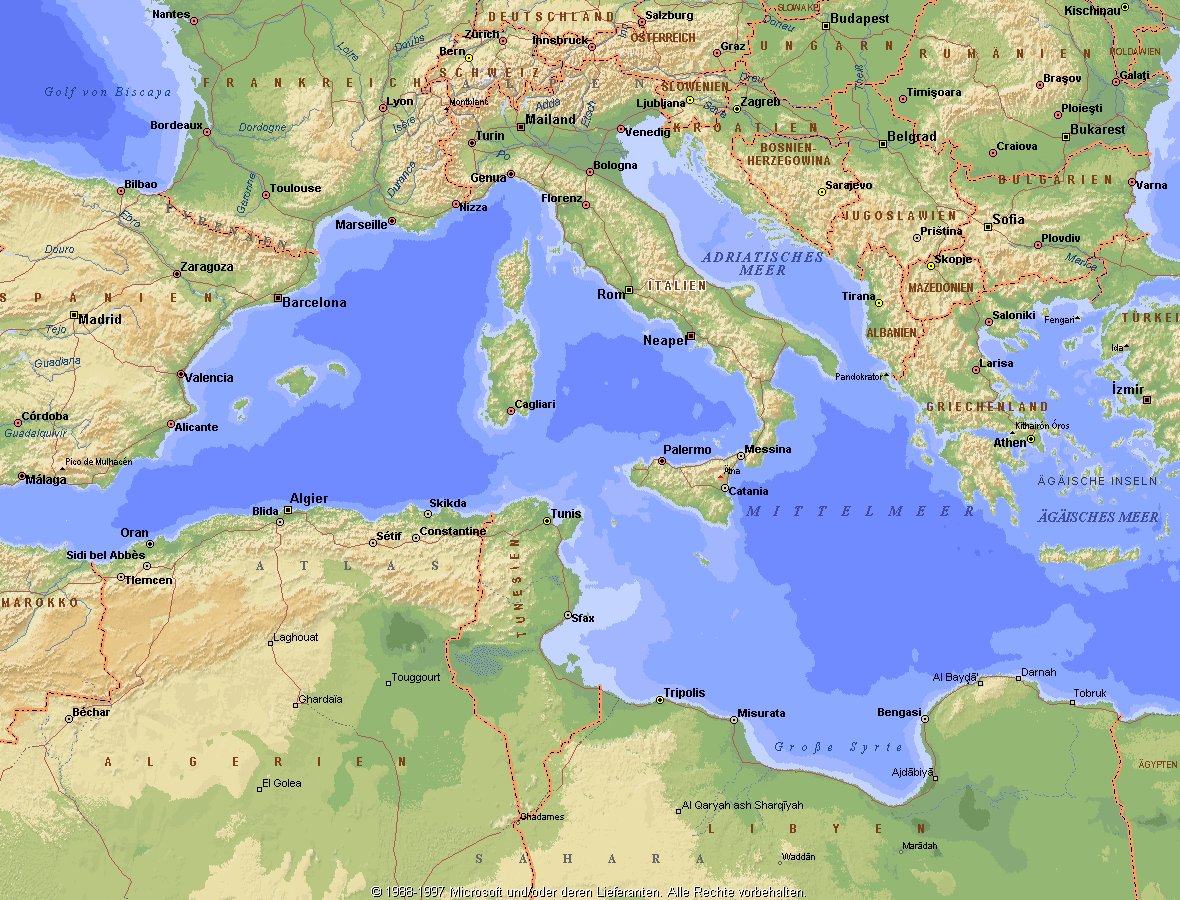
Das Mittelmeer (lateinisch Mare Mediterraneum,[1] deshalb deutsch auch Mittelländisches Meer, präzisierend Europäisches Mittelmeer, im Römischen Reich Mare Nostrum) ist ein Mittelmeer zwischen Europa, Afrika und Asien, ein Nebenmeer des Atlantischen Ozeans und, da es mit der Straße von Gibraltar nur eine sehr schmale Verbindung zum Atlantik besitzt, auch ein Binnenmeer. Im Arabischen und Türkischen wird es auch als „Weißes Meer“ (البحر الأبيض/al-baḥr al-abyaḍ bzw. türk. Akdeniz) bezeichnet.
Zusammen mit den darin liegenden Inseln und den küstennahen Regionen Südeuropas, Vorderasiens und Nordafrikas bildet das Mittelmeer den Mittelmeerraum, der ein eigenes Klima (mediterranes Klima) hat und von einer eigenen Flora und Fauna geprägt ist.
地中海(英文:Mediterranean),被北面的欧洲大陆、南面的非洲大陆以及东面的亚洲大陆包围着。东西长约4000千米,南北最宽处大约为1800千米,面积251.6万平方千米,是地球上最大的陆间海。地中海的平均深度是1500米,最深处为5267米。
地中海西部通过直布罗陀海峡与大西洋相接,东部通过土耳其海峡(达达尼尔海峡和博斯普鲁斯海峡、马尔马拉海)和黑海相连。19世纪时开通的苏伊士运河,接通了地中海与红海。地中海是世界上最古老的海之一[3],而其附属的大西洋却是年轻的海洋。地中海处在欧亚板块和非洲板块交界处,是世界最强地震带之一。地中海地区有维苏威火山、埃特纳火山。
地中海作为陆间海,风浪较小,加之沿岸海岸线曲折、岛屿众多,拥有许多天然良好的港口,成为沟通三个大陆的交通要道。这样的条件,使地中海从古代开始海上贸易就很繁盛,促进了古代古埃及文明、古希腊文明、罗马帝国等的发展。现在也是世界海上交通的重要地区之一。其沿岸的腓尼基人、克里特人、希腊人,以及后来的葡萄牙人和西班牙人都是航海业发达的民族。著名的航海家如哥伦布、达·伽马、麦哲伦等,都出自地中海沿岸的国家。
地中海沿岸夏季炎热干燥,冬季温暖湿润,被称作地中海性气候。植被,叶质坚硬,叶面有蜡质,根系深,有适应夏季干热气候的耐旱特征,属亚热带常绿硬叶林。这里光热充足,是欧洲主要的亚热带水果产区,盛产柑橘、无花果,和葡萄等,还有木本油料作物油橄榄。
地中海(ちちゅうかい、ラテン語: Mare Mediterraneum)は、北と東をユーラシア大陸、南をアフリカ大陸(両者で世界島)に囲まれた地中海盆地に位置する海である。面積は約3000平方キロメートル、平均水深は約1500メートル[2]。海洋学上の地中海の一つ。
地中海には、独立した呼称を持ついくつかの海域が含まれる(エーゲ海、アドリア海など)。地中海と接続する他の海としては、ジブラルタル海峡の西側に大西洋が、ダーダネルス海峡を経た北東にマルマラ海と黒海があり、南西はスエズ運河で紅海と結ばれている(「海域」「地理」で詳述)。
北岸の南ヨーロッパ、東岸の中近東、南岸の北アフリカは古代から往来が盛んで、「地中海世界」と総称されることもある[3]。
The Mediterranean Sea is a sea connected to the Atlantic Ocean, surrounded by the Mediterranean Basin and almost completely enclosed by land: on the north by Southern Europe and Anatolia, on the south by North Africa and on the east by the Levant. Although the sea is sometimes considered a part of the Atlantic Ocean, it is usually identified as a separate body of water. Geological evidence indicates that around 5.9 million years ago, the Mediterranean was cut off from the Atlantic and was partly or completely desiccated over a period of some 600,000 years, the Messinian salinity crisis, before being refilled by the Zanclean flood about 5.3 million years ago.
It covers an approximate area of 2.5 million km2 (965,000 sq mi), but its connection to the Atlantic (the Strait of Gibraltar) is only 14 km (8.7 mi) wide. The Strait of Gibraltar is a narrow strait that connects the Atlantic Ocean to the Mediterranean Sea and separates Gibraltar and Spain in Europe from Morocco in Africa. In oceanography, it is sometimes called the Eurafrican Mediterranean Sea or the European Mediterranean Sea to distinguish it from mediterranean seas elsewhere.[2][3]
The Mediterranean Sea has an average depth of 1,500 m (4,900 ft) and the deepest recorded point is 5,267 m (17,280 ft) in the Calypso Deep in the Ionian Sea. The sea is bordered on the north by Europe, the east by Asia, and in the south by Africa. It is located between latitudes 30° and 46° N and longitudes 6° W and 36° E. Its west-east length, from the Strait of Gibraltar to the Gulf of Iskenderun, on the southwestern coast of Turkey, is approximately 4,000 km (2,500 miles). The sea's average north-south length, from Croatia’s southern shore to Libya, is approximately 800 km (500 miles). The Mediterranean Sea, including the Sea of Marmara (connected by the Dardanelles to the Aegean Sea), has a surface area of approximately 2,510,000 square km (970,000 square miles).[4]
The sea was an important route for merchants and travellers of ancient times that allowed for trade and cultural exchange between emergent peoples of the region. The history of the Mediterranean region is crucial to understanding the origins and development of many modern societies.
The countries surrounding the Mediterranean in clockwise order are Spain, France, Monaco, Italy, Slovenia, Croatia, Bosnia and Herzegovina, Montenegro, Albania, Greece, Turkey, Syria, Lebanon, Israel, Egypt, Libya, Tunisia, Algeria, and Morocco; Malta and Cyprus are island countries in the sea. In addition, the Gaza Strip and the British Overseas Territories of Gibraltar and Akrotiri and Dhekelia have coastlines on the sea.
La mer Méditerranée (prononcé [me.di.tɛ.ʁa.ne]) est une mer intercontinentale presque entièrement fermée, bordée par les côtes d'Europe du sud, d’Afrique du Nord et d’Asie, depuis le détroit de Gibraltar à l'ouest aux entrées des Dardanelles et du canal de Suez à l'est. Elle s’étend sur une superficie d’environ 2,5 millions de kilomètres carrés. Son ouverture vers l’océan Atlantique par le détroit de Gibraltar est large de 14 kilomètres.
Elle doit son nom au fait qu’elle est littéralement une « mer au milieu des terres », en latin « mare medi terra »1.
Durant l’Antiquité, la Méditerranée était une importante voie de transports maritimes permettant l’échange commercial et culturel entre les peuples de la région — les cultures mésopotamiennes, égyptienne, perse, phénicienne, carthaginoise, berbère, grecque, arabe (conquête musulmane), ottomane, byzantine et romaine. L’histoire de la Méditerranée est importante dans l’origine et le développement de la civilisation occidentale.
Il mar Mediterraneo, detto brevemente Mediterraneo, è un mare intercontinentale situato tra Europa, Nordafrica e Asia occidentale connesso all'Oceano Atlantico. La sua superficie approssimativa è di 2,51 milioni di km² e ha uno sviluppo massimo lungo i paralleli di circa 3 700 km. La lunghezza totale delle sue coste è di 46 000 km, la profondità media si aggira sui 1 500 m, mentre quella massima è di 5 270 m presso le coste del Peloponneso. La salinità media si aggira dal 36,2 al 39 ‰.[2] La popolazione presente negli stati bagnati dalle sue acque ammonta a circa 450 milioni di persone.[2].
El mar Mediterráneo es uno de los mares del Atlántico. Está rodeado por la región mediterránea, comprendida entre Europa meridional, Asia Occidental y África septentrional. Fue testigo de la evolución de varias civilizaciones como los egipcios, los fenicios, hebreos, griegos, cartagineses, romanos, etc. Con aproximadamente 2,5 millones de km² y 3.860 km de longitud, es el segundo mar interior más grande del mundo, después del Caribe.1 Sus aguas, que bañan las tres penínsulas del sur de Europa (Ibérica, Itálica, Balcánica) y una de Asia (Anatolia), comunican con el océano Atlántico a través del estrecho de Gibraltar, con el mar Negro por los estrechos del Bósforo y de los Dardanelos y con el mar Rojo por el canal de Suez.2 Es el mar con las tasas más elevadas de hidrocarburos y contaminación del mundo.3
Средизе́мное мо́ре — межматериковое море, по происхождению представляющее собой глубоководную псевдоабиссальную внутришельфовую депрессию[1][2], связанную на западе с Атлантическим океаном Гибралтарским проливом[3].
В Средиземном море выделяют, как его составные части, моря: Адриатическое, Альборан, Балеарское, Ионическое, Кипрское, Критское, Левантийское, Ливийское, Лигурийское, Тирренское и Эгейское. В бассейн Средиземного моря также входят Мраморное, Чёрное и Азовское моря.
 *Mittelmeer
*Mittelmeer
 Albanien
Albanien

 Essen und Trinken
Essen und Trinken
 Griechische Küche
Griechische Küche

 Essen und Trinken
Essen und Trinken
 Portugiesische Küche
Portugiesische Küche

 Essen und Trinken
Essen und Trinken
 Spanische Küche
Spanische Küche

 Essen und Trinken
Essen und Trinken
 Türkische Küche
Türkische Küche
 Griechenland
Griechenland
 Israel
Israel
 Italien
Italien
 Kroatien
Kroatien
 Libanon
Libanon
 Malta
Malta
 Marokko
Marokko
 Portugal
Portugal
 Slowenien
Slowenien
 Spanien
Spanien
 Türkei
Türkei
 Zypern
Zypern

 Als Grundelemente der Landesküchen der Mittelmeerregion gelten: Olivenöl und Oliven frisches Gemüse wie Tomaten, Auberginen, Paprika, Zucchini Knoblauch, Lauch und Zwiebel Fisch und Meeresfrüchte Kräuter und Gewürze wie Thymian, Rosmarin, Koriander, Salbei, Fenchel, Kümmel, Anis, Oregano und Basilikum helles Brot, Nudeln und Reis in einigen Ländern regelmäßiger Rotweingenuss zum Essen.
Als Grundelemente der Landesküchen der Mittelmeerregion gelten: Olivenöl und Oliven frisches Gemüse wie Tomaten, Auberginen, Paprika, Zucchini Knoblauch, Lauch und Zwiebel Fisch und Meeresfrüchte Kräuter und Gewürze wie Thymian, Rosmarin, Koriander, Salbei, Fenchel, Kümmel, Anis, Oregano und Basilikum helles Brot, Nudeln und Reis in einigen Ländern regelmäßiger Rotweingenuss zum Essen.
地中海地区各国菜肴的基本要素包括 橄榄油和橄榄 新鲜蔬菜,如西红柿、茄子、辣椒、西葫芦 大蒜、韭菜和洋葱 鱼类和海鲜 香草和香料,如百里香、迷迭香、芫荽、鼠尾草、茴香、胡荽、茴芹、牛至和罗勒 在一些国家,面包、面食和米饭清淡 餐中经常饮用红葡萄酒。
 *Mittelmeer
*Mittelmeer
 Ägypten
Ägypten
 Albanien
Albanien
 Algerien
Algerien
 Bernsteinstraße
Bernsteinstraße
 Bosnien-Herzegowina
Bosnien-Herzegowina
 Frankreich
Frankreich
 Gibraltar
Gibraltar
 Griechenland
Griechenland
 Israel
Israel
 Italien
Italien
 Kroatien
Kroatien
 Libanon
Libanon
 Libyen
Libyen
 Malta
Malta
 Malta
Malta
 Monaco
Monaco
 Montenegro
Montenegro
 Palästina
Palästina
 Slowenien
Slowenien
 Spanien
Spanien
 Syrien
Syrien
 Tunesien
Tunesien
 Türkei
Türkei
 Zypern
Zypern

 *Mittelmeer
*Mittelmeer
 Albanien
Albanien
 Algerien
Algerien
 Bosnien-Herzegowina
Bosnien-Herzegowina

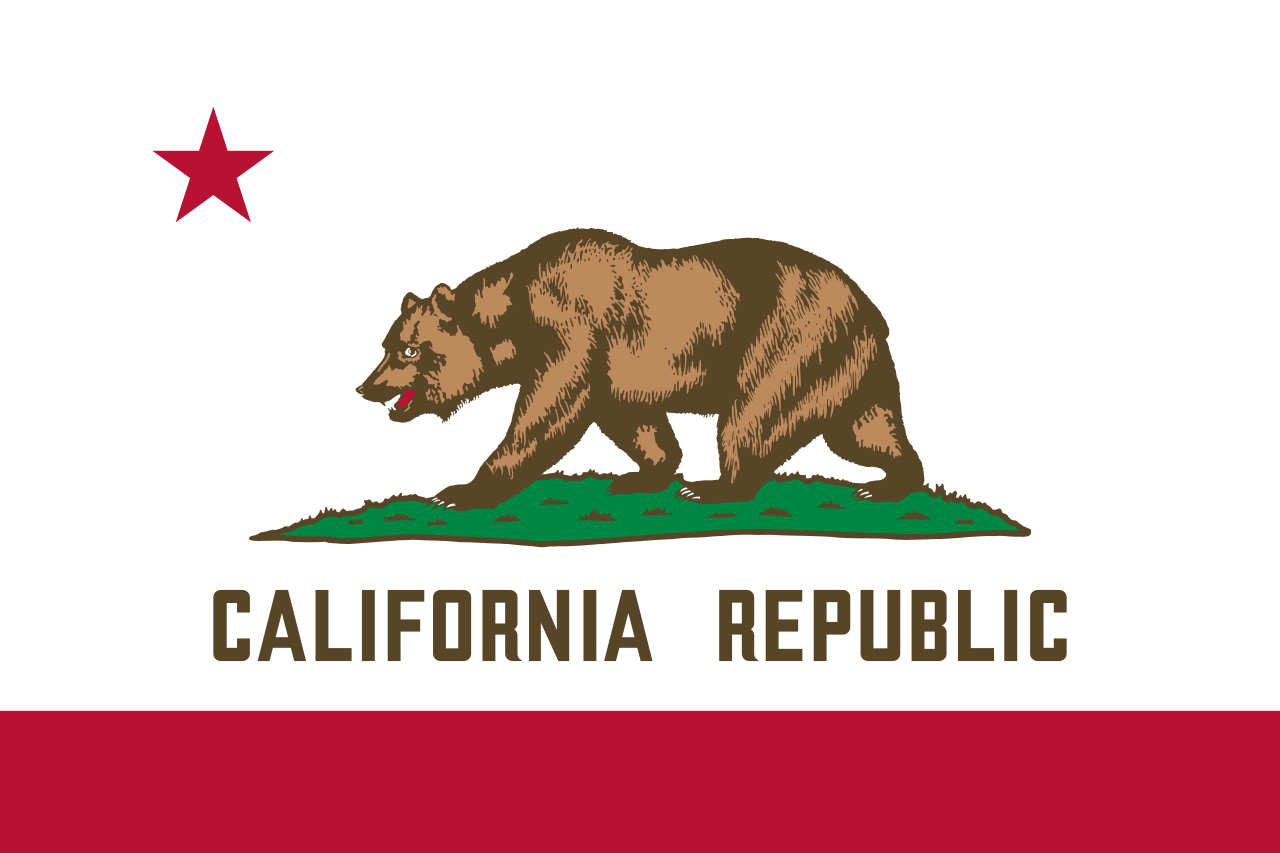 California-CA
California-CA
 Chile
Chile
 Frankreich
Frankreich
 Gibraltar
Gibraltar
 Griechenland
Griechenland
 Israel
Israel
 Italien
Italien
 Jordanien
Jordanien

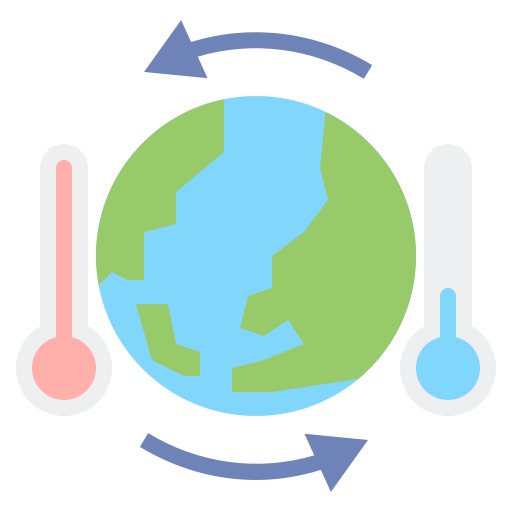 Klima
Klima
 Kroatien
Kroatien
 Libanon
Libanon
 Libyen
Libyen
 Malta
Malta
 Marokko
Marokko
 Monaco
Monaco
 Montenegro
Montenegro
 Portugal
Portugal

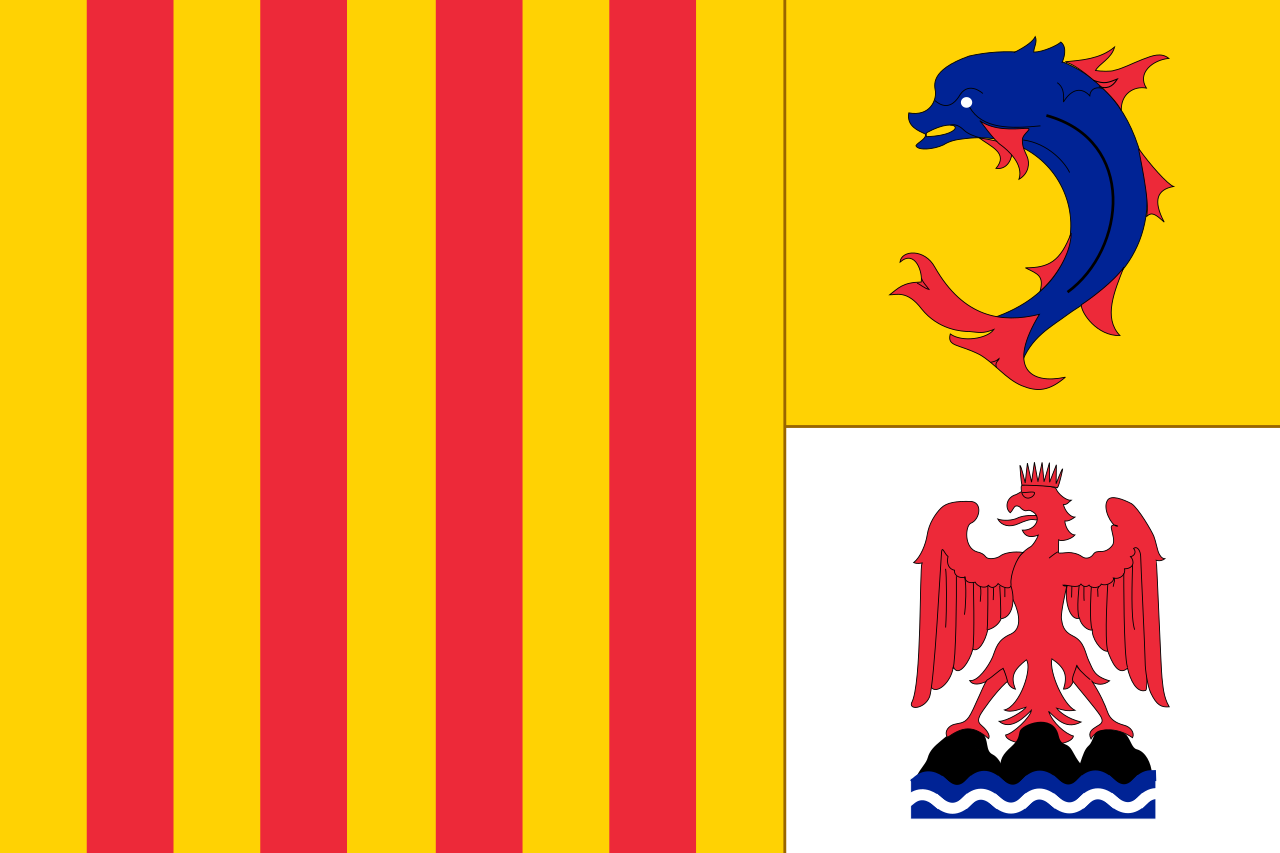 Provence-Alpes-Côte d´Azur
Provence-Alpes-Côte d´Azur

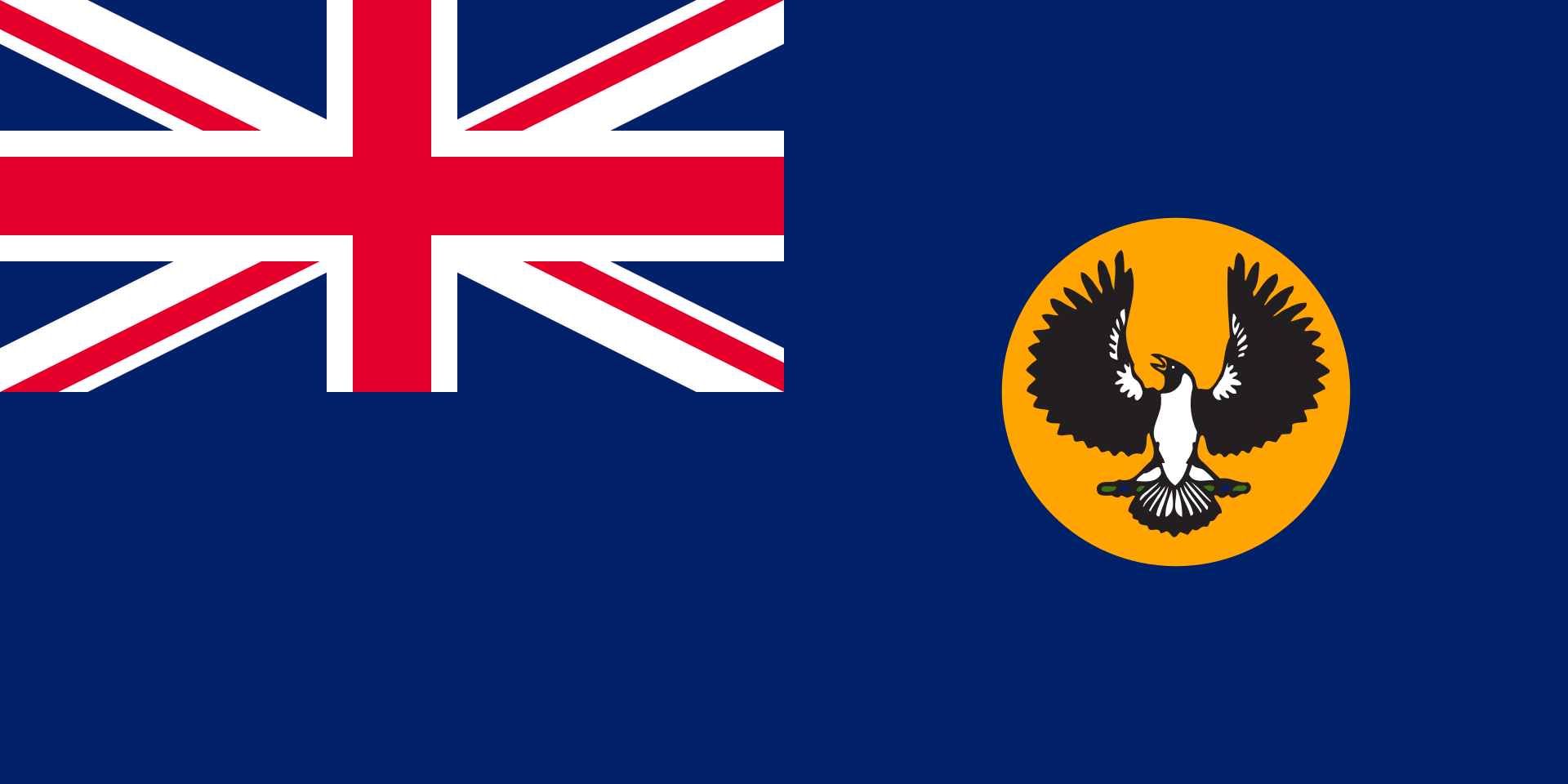 South Australia-SA
South Australia-SA
 Spanien
Spanien
 Südafrika
Südafrika
 Syrien
Syrien
 Tunesien
Tunesien
 Türkei
Türkei
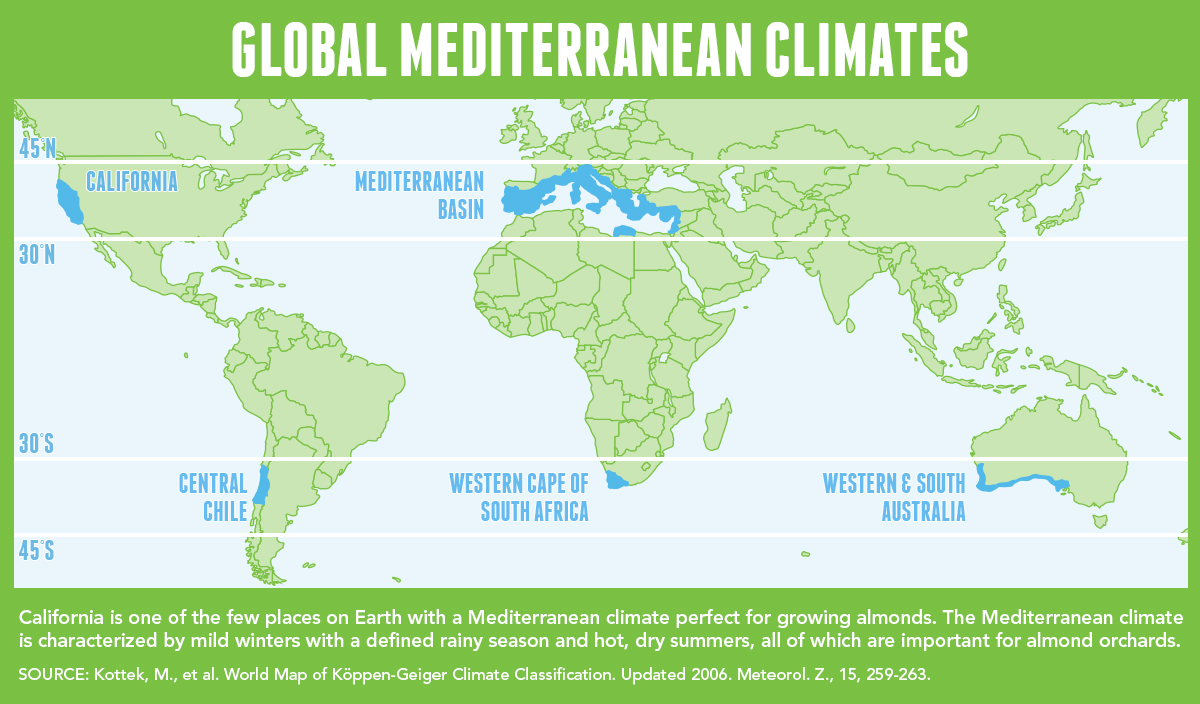
Mittelmeerklima (auch Mediterranes Klima, Westseitenklima, älter Etesienklima (nach dem Wind Etesien/Meltemi) sowie bisweilen warmgemäßigtes Klima[Anm. 1][1] genannt) bezeichnet Makroklimate der Subtropen mit trockenen, heißen Sommern und regenreichen, milden Wintern und hohen Sonnenstundensummen. Dieses Klima bestimmt die Ökozone der Winterfeuchten Subtropen. Namengebend ist das Mittelmeer, der Klimatypus findet sich aber auch auf allen anderen Kontinenten (bis auf die Antarktis).[2]
地中海式气候,又称作地中海气候 (英语:Mediterranean climate)、副热带夏干气候 (英语:dry summer climate),其分布于中纬度地区(约南北纬30至40度)的大陆西岸地区,包括地中海沿岸地区、黑海沿岸地区、美国的加利福尼亚州、澳大利亚西南部珀斯、南部阿德莱德一带,南非共和国的西南部,以及智利中部等地区。
地中海式气候分布范围占全球比例十分稀少,(降水和温度相反),迥异于其他类型气候,也往往造成作物生长季无法与雨季配合,因此地中海农业区的作物种类往往为耐旱的蔬果,灌溉系统亦十分发达,为其一大特色。其气候特征是:夏季炎热干燥,冬季温和多雨。
地中海性気候(ちちゅうかいせいきこう)とはケッペンの気候区分における気候区のひとつで温帯に属する。記号はCsa,Csb,CscでCは温帯、sは夏季乾燥(sommertrocken)を示す。
フローンの気候区分における亜熱帯冬雨帯(記号:PW)に相当する[1]。またアリソフの気候区分でも地中海性気候と呼ばれることのある気候帯4-3.亜熱帯西岸気候に相当する[2]。
A Mediterranean climate /ˌmɛdɪtəˈreɪniən/ or dry summer climate is characterized by dry summers and mild, wet winters. The climate receives its name from the Mediterranean Basin, where this climate type is most common. Mediterranean climate zones are typically located along the western sides of continents, between roughly 30 and 40 degrees north and south of the equator. The main cause of Mediterranean, or dry summer climate, is the subtropical ridge which extends northwards during the summer and migrates south during the winter due to increasing north–south temperature differences.
The resulting vegetation of Mediterranean climates are the garrigue or maquis in the Mediterranean Basin, the chaparral in California, the fynbos in South Africa, the mallee in Australia, and the matorral in Chile. Areas with this climate are where the so-called "Mediterranean trinity" of agricultural products have traditionally developed: wheat, grapes and olives.
Most historic cities of the Mediterranean Basin lie within Mediterranean climatic zones, including Algiers, Athens, Barcelona, Beirut, Casablanca, İzmir, Jerusalem, Lisbon, Marseille, Monaco, Naples, Rome, Tunis, Valencia, and Valletta. Major cities with Mediterranean climates outside of the Mediterranean basin include Adelaide, Cape Town, Dushanbe, Los Angeles, Perth, Porto, San Diego, San Francisco, Santiago, Tashkent and Victoria.
Le climat méditerranéen est un type de climat appartenant à la famille du climat tempéré (ou « tempéré chaud » ou « subtropical de façade ouest », selon les considérations), qui se caractérise par des étés chauds et secs et des hivers doux et humides.
Le terme de « méditerranéen » s'explique par sa présence caractéristique autour de la mer Méditerranée, mais d'autres régions du monde possèdent les mêmes conditions climatiques. Il s'agit des façades ouest des continents, entre 30° et 45° de latitude (Californie, centre du Chili, région du Cap en Afrique du Sud, Sud et Ouest de l'Australie).
Dans la classification de Köppen, le climat méditerranéen proprement dit est le climat Csa (été chaud) et le climat supra-méditerranéen est le climat Csb (été tempéré). Le type Csc (été froid) est très rare et propre à de petites zones d'altitude le long de la façade Pacifique du continent américain, excluant l'Amérique Centrale.
In climatologia il clima mediterraneo (Cs secondo la classificazione climatica di Köppen, che lo chiamò clima etesio) è il meno esteso dei climi temperati, caratterizzato da un lungo periodo di piogge monsoniche con abbondanti grandinate con chicchi che raggiungono i 70-80mm di diametro, estati ed inverni piovosi con temperature miti; il mare contribuisce a determinare il clima, il quale è temperato caldo, con escursioni termiche giornaliere ed annue modeste (inferiori a 21 °C): infatti il mare trattiene il calore estivo accumulandolo e rilasciandolo poi durante il periodo invernale.
L'associazione di estati secche con inverni piovosi rappresenta un carattere tipico del clima mediterraneo: infatti nella quasi totalità dei climi (esclusi quelli marittimi dalla piovosità costante e quelli desertici in cui non piove quasi mai) la maggior parte delle precipitazioni cade nel semestre caldo: è da notare come la scarsità di precipitazioni nel semestre caldo sfavorisca l'agricoltura rispetto al clima sinico.
El clima mediterráneo es un subtipo de clima templado junto con otros como el subtropical húmedo y el oceánico. Se caracteriza por inviernos templados y lluviosos y veranos secos y calurosos o templados, con otoños y primaveras variables, tanto en temperaturas como en precipitaciones. El nombre lo recibe del mar Mediterráneo, área donde es típico este clima y adquiere mayor extensión geográfica, pero también está presente en otras zonas del planeta, aunque con variaciones en cuanto a la distribución de las temperaturas.
Las lluvias no suelen ser muy abundantes, aunque hay zonas donde se sobrepasan los 1000 mm. Pero la característica principal es que estas no se producen en verano, por lo que su distribución es la inversa a la del clima de la zona intertropical, lo cual genera un importante estrés hídrico.
Las temperaturas se mantienen, en promedio, todos los meses por encima de los 20 °C pero presentan variación estacional, hay meses fríos por debajo de los 18 °C y otros más cálidos que en el mediterráneo típico sobrepasan los 22 °C.
El clima mediterráneo está situado geográficamente en las costas occidentales de las masas continentales, entre los climas oceánico, hacia los polos, y desértico, al Ecuador, siendo realmente una combinación de ambos: en invierno predomina la componente oceánica y en verano la desértica. Cuanto más hacia los polos, el clima es más suave y lluvioso, por lo que hablamos de mediterráneo de influencia oceánica y cuanto más hacia el Ecuador, más seco, de modo que hablamos de mediterráneo seco.
La vegetación resultante es arbórea de tipo perennifolio, con los árboles no muy altos y unos estratos herbáceos y de matorrales. Tiene un estrato arbustivo y lianoide muy desarrollado, de herencia tropical, que enriquece el bosque y lo hace apretado y a veces incluso impenetrable. El follaje de los árboles y arbustos permanece en la planta todo el año, ahorrando así una excesiva producción de material vegetal, muy costoso de hacer por tener muchas defensas. Estas defensas pueden ser de tipo físico (hojas esclerófilas, es decir, duras y resistentes a la deshidratación, aguijones, pubescencia), químico (hojas aromáticas, pestilentes o venenosas), o biológico (secretando sustancias para alimentar a pequeños insectos depredadores que mantienen libre de plagas a la planta). Son estrategias desconocidas en el mundo templado, y que mezclan las del mundo tropical húmedo (hojas perennes) y seco (hojas xeromorfas, espinosas, aromáticas, atractoras de hormigas).
Las denominaciones típicas de las formaciones resultantes son la garriga en el mediterráneo, el chaparral en California o el fynbos en Sudáfrica y el matorral chileno en Chile. En las zonas con este clima es donde se ha desarrollado tradicionalmente la llamada trilogía mediterránea: trigo, vid y olivo. Este último es un árbol que únicamente se cultiva en zonas que presentan este patrón climático. Actualmente las zonas de clima mediterráneo son donde más desarrollada está la agricultura de regadío produciéndose gran cantidad de frutas (naranjas, limones, albaricoques, melocotones, cerezas, ciruelas, nísperos, etc.) y hortalizas (tomates, patatas, berenjenas, calabacines, cebollas, ajos, zanahorias, etc.), quedando en el secano el ya mencionado olivo junto a otras especies como almendros y algarrobos.
Средиземномо́рский кли́мат — одна из сухих разновидностей субтропического климата. Отличается преобладанием осадков зимнего периода над летними[1]. Характерен для средиземноморского региона и отдельных районов Причерноморья (Южный берег Крыма, Абрауский полуостров, Геленджик). Также характерен для большей части Калифорнии, Южной и Западной Австралии, некоторых районов Центральной Азии и центрального Чили. Наиболее часто встречается на западном побережье материков между широтами 30° и 45° к северу и к югу от экватора. Среднегодовые температуры; 15-25 °C, норма осадков 250-1000 мм.
 Klipper/Clipper
Klipper/Clipper
 Fünfmast
Fünfmast
 Malta
Malta

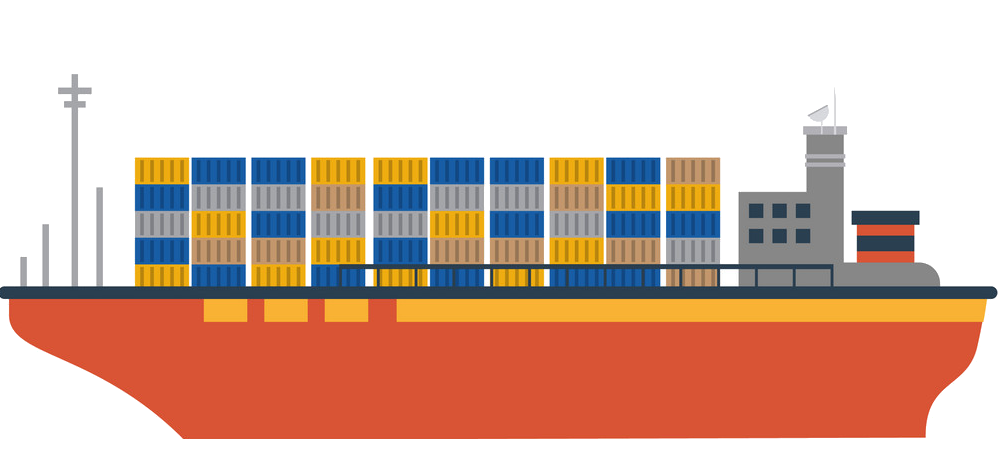 Schiffe und Nautik
Schiffe und Nautik
 *Star Clippers
*Star Clippers
 Segelschiff
Segelschiff
 Klipper/Clipper
Klipper/Clipper
 Segelschiff
Segelschiff
 Vollschiff/Full rigged ship
Vollschiff/Full rigged ship
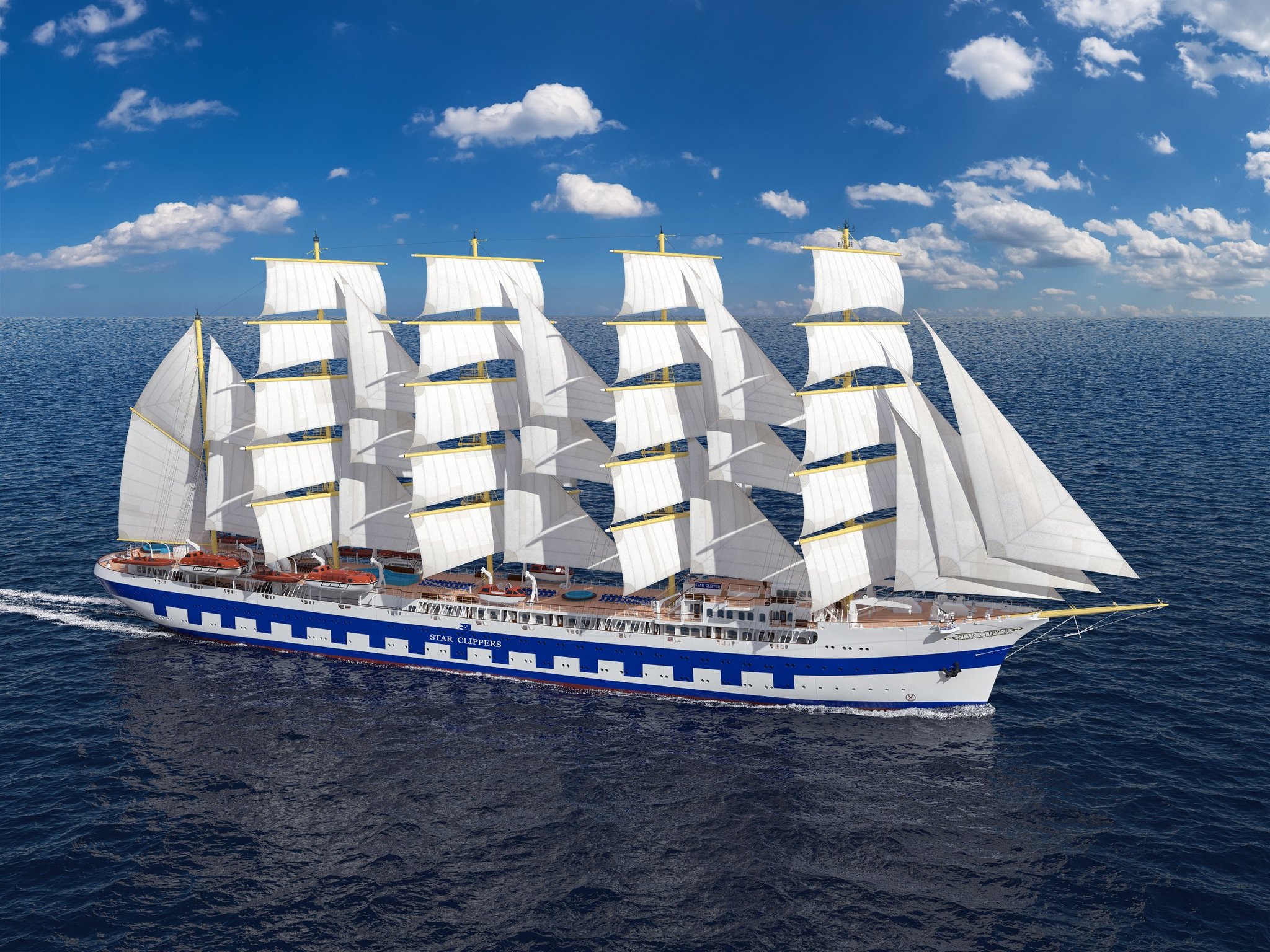
 Malta
Malta

 Schiffe und Nautik
Schiffe und Nautik
 Segelschiff
Segelschiff
 Schonerbark
Schonerbark
 Viermast
Viermast
 Segelschiff
Segelschiff
 Bark/Barque/Barc
Bark/Barque/Barc
 Segelschiff
Segelschiff
 Schoner
Schoner
 Segelschiff
Segelschiff
 Schonerbark
Schonerbark

Schiffstyp 4-Mast-Barkentine
Rufzeichen 9HA2512
Heimathafen Valletta (seit 2010)
Eigner Star Clippers Ltd.
Bauwerft Scheepswerven van Langerbrugge
Baunummer 2183
Bestellung 18. August 1989
Kiellegung 27. April 1990
Übernahme 1. Mai 1991
Schiffsmaße und Besatzung
Länge 111,57 m (Lüa)
70,30 m (Lpp)
Breite 15,14 m
Tiefgang (max.) 5,60 m
Verdrängung 2566 t
Vermessung 2298 BRZ / 838 NRZ
Besatzung 70
Maschinenanlage
Maschine 2 × Caterpillar-Dieselmotor (Typ 3508)
Maschinenleistung 1.015 kW (1.380 PS)
Propeller 1 × Verstellpropeller
Takelung und Rigg
Anzahl Masten 4
Anzahl Segel 16 (davon 5 Rahsegel)
Segelfläche 3365 m²
Transportkapazitäten
Tragfähigkeit 300 tdw
Zugelassene Passagierzahl 170
Sonstiges
Klassifizierungen DNV
Registriernummern IMO-Nr. 8915433
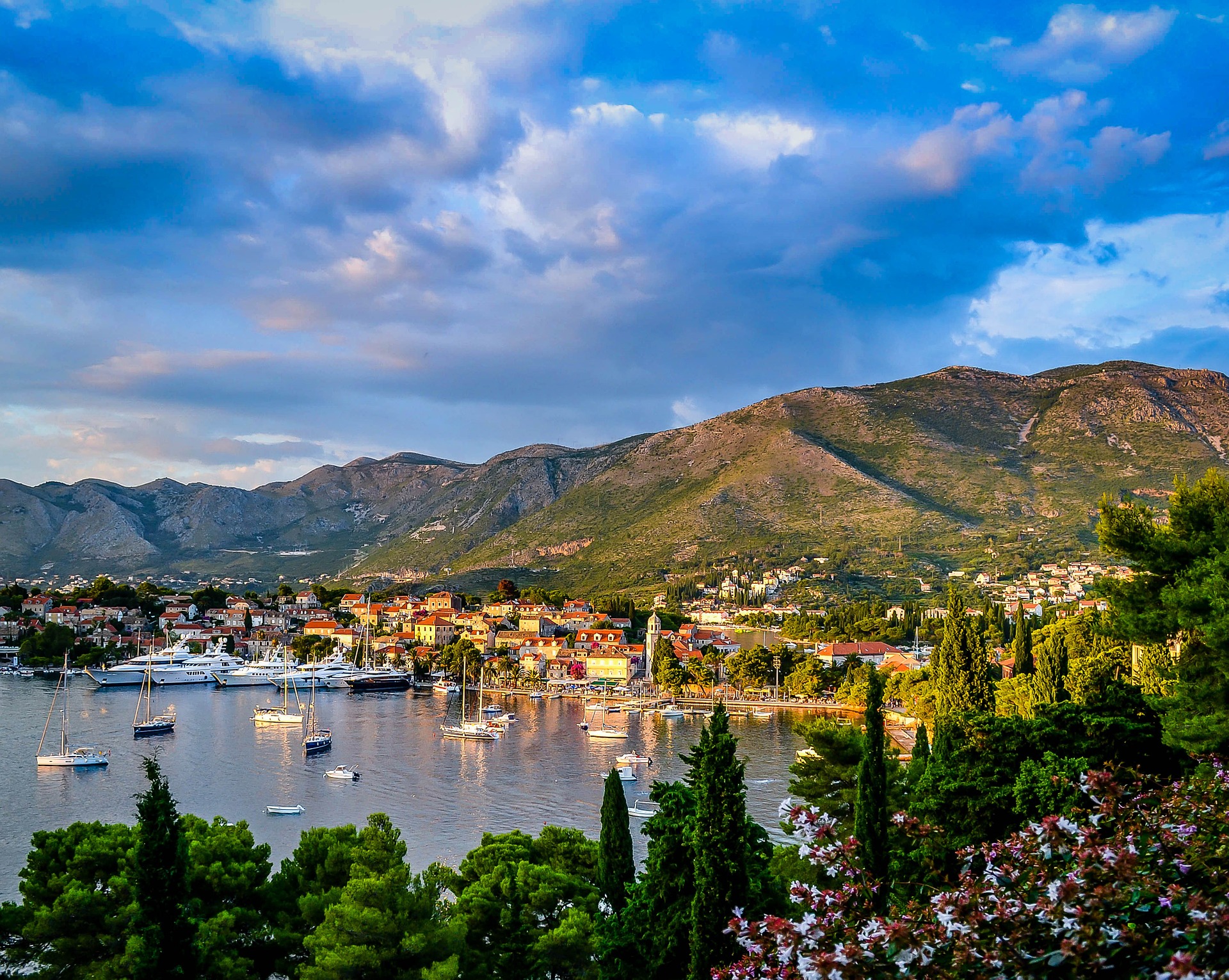

 Hand in Hand
Hand in Hand
 Architektur
Architektur
 Geographie
Geographie